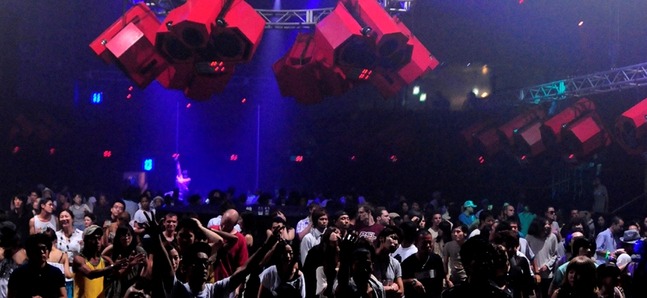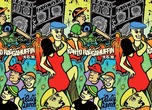
Photo by Eliu*
Posted: Fri Oct 09 2009
Like any major American or European city, Tokyo enjoys the luxury of world class DJs flooding the city's high-tech clubs every weekend. Time Out club listings come in handy when choosing where you want to go, and which night has the music you want to hear. If you pick a decent club you can be certain that you’ll hear top tunes.
There are a few things that may surprise first-time Tokyo clubbers: people sleep in clubs; there's a permanent haze of cigarette smoke; you won’t be allowed in without identification; under-20s are banned; and once you leave, that's it, there’s no going back in again. Finally, drugs do exist but they're extremely expensive and punishments are very harsh. You’ve been warned.
Many Japanese regard clubbing as an unusual way to spend the weekend and as a result Tokyo’s club scene is relatively small in relation to the size of the city. Also, the fact that several of the legendary clubs that were popular in the 1990s - such as Shinjuku LIQUIDROOM, Maniac Love and Club Yellow – have now closed has meant that the current clubbing scene is not quite as exciting as it used to be. Ask any clubber and they’d probably say that the city would benefit from the arrival of a new groundbreaking club. But you’d be wrong to think all the party people have disappeared; you’ll find the biggest and best-known nightlife venues in Shibuya and scattered throughout Daikanyama, Ebisu and Aoyama. Clubs such as Womb, Air, Unit and Ageha are the largest and most famous. If you're into hip hop or reggae, you may want to venture out to Club Nuts, Harlem or Vuenos. The Room and JZ Brat are recommended for jazz heads. Lounges such as Liquid Loft (at LIQUIDROOM) and Microcosmos offer more danceable sets on weekend nights. Places including Club Module and Loop are perfect for real get-down dance sessions. Smaller, quieter local spots like Organ Bar, Koara and Oath are ideal for people who value conversation as much as great music. Mado Lounge, located on the 52nd floor of Roppongi Hill boasts magnificent views.
But above all, the most enjoyable part of clubbing in Tokyo is the up-for-it, party-loving, musically tuned-in crowd. Tokyoites can't live without their music, a fact proven by the significant number of record stores that enjoy a healthy existence throughout the city. But it’s not just in Tokyo that you’ll find music aficionados. Japanese audiences have always been open to experimental or spaced-out music and tend to be well informed about what they like, to the delight of DJs and musicians from abroad who often play longer or more unusual sets to Japanese audiences. There are also some brilliant homegrown DJs who have yet to break out on to the global scene, so keep your ears and mind open and enjoy the night the way Japan does by partying until the first train of the morning.
Air
With an upgrade in sound equipment over the last year, Air is shaping up to be one of the best clubs in Tokyo. Most of the big house acts moved here following the closure of Yellow, so the music tends to run along the lines of house, techno or electro on the weekend. And the crowd? It’s magnet for fashionistas and music maniacs alike.
Womb
This Tokyo superclub is the equivalent of Ibiza's Space, Frankfurt's Cocoon or London's Fabric: big names, plenty of tourists and packed every weekend. The gigantic disco ball and the lasers are amazing, though the sound could be better.
Unit
A versatile gem that offers a diverse but tasteful lineup both as a live venue and a club. It’s also got a large café & bar space which stays open until the morning, and a smaller basement club space called Saloon. A well-rounded facility in the middle of the hip Daikanyama area.
Ageha
Aghea is a fifteen minute shuttle bus trip from Shibuya, in Shin-Kiba by Tokyo bay, where there enough space to build a complex as large as this. Its huge arena holds some 2,400 people, and there are three smaller spaces including an outdoor tent and an ornamental pool, as well as some food booths in between. It’s a bit like a festival and very commercial though entertaining and worth the effort it takes to get there.
LIQUIDROOM / Liquid Loft
Since they made the move from Shinjuku to Ebisu a few years ago, LIQUIDROOM has remained largely a live concert venue. The main room, arguably the best club space in Tokyo, is usually closed though it does open on special occasions. Liquid Loft, the lounge space on the second floor, holds wide range of late night events. Enjoy the cosy interior, which was exclusively designed by one of Tokyo's star fashion designers, Yasuko Furuta of TOGA imprint.
Microcosmos
One of the newest additions to the Tokyo's venue list. It's a spacious, nicely decorated café by day, but some nights the windows get covered, the tables are pushed out of the way and a dancefloor is created in the middle. Surprise guest DJs such as Francois K, Danny Krivit and Derrick May make appearances and often play more laid-back sets.
Tweets
- About Us |
- Work for Time Out |
- Send us info |
- Advertising |
- Mobile edition |
- Terms & Conditions |
- Privacy policy |
- Contact Us
Copyright © 2014 Time Out Tokyo











Add your comment